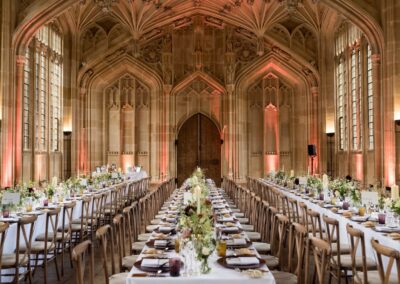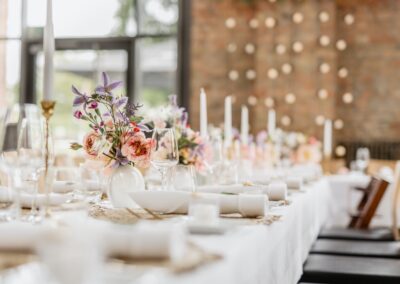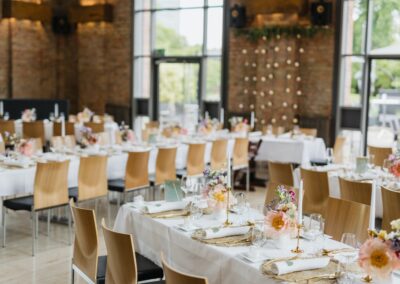Weddings are joyous celebrations of love and commitment, bringing together families and friends to witness the union of two souls. However, as we become more aware of the environmental and social impacts of our choices, couples are increasingly seeking ways to make their special day more sustainable and meaningful. In this quest for eco-friendly nuptials, the Sustainable Wedding Alliance (SWA) accreditation has emerged as a pivotal tool for couples and wedding planners alike. In this article, we will explore why the SWA accreditation matters for today’s wedding planning and how it can contribute to a more sustainable and conscious wedding experience.
Firstly, let’s delve into the concept of sustainability in the context of weddings. Traditionally, weddings have been associated with extravagance, excess, and waste. From elaborate floral arrangements to single-use decorations and excessive food waste, the environmental footprint of a typical wedding can be substantial. Moreover, the wedding industry often relies on exploitative labor practices and unsustainable sourcing of materials. However, with the rise of the sustainability movement, couples are seeking alternatives that align with their values and reduce their ecological impact.
This is where the Sustainable Wedding Alliance comes into play. The SWA is a global organisation dedicated to promoting sustainable practices within the wedding industry. It provides an accreditation process that assesses wedding venues, suppliers, and planners based on their commitment to environmental, social, and ethical standards. By choosing SWA accredited businesses, couples can ensure that their wedding aligns with their values and contributes positively to the world.
One of the primary reasons why the SWA accreditation matters for today’s wedding planning is its focus on environmental sustainability. The SWA encourages venues and suppliers to adopt environmentally friendly practices such as minimising waste, conserving energy, and using sustainable materials. For example, SWA accredited venues may implement recycling and/or composting programs, source locally grown and organic food, and prioritise energy-efficient lighting and appliances. By choosing SWA accredited businesses, couples can rest assured that their wedding will have a reduced carbon footprint and minimise harm to the environment.
Furthermore, the SWA accreditation goes beyond environmental sustainability and extends to social and ethical considerations. The organisation emphasises living wage practices, diversity and inclusion, and community engagement. SWA accredited businesses are committed to treating their employees fairly, paying fair wages, and ensuring safe working conditions. They also actively promote diversity in their workforce and embrace inclusivity in their services. In addition, SWA accredited businesses may participate in community initiatives, supporting local charities and giving back to the communities in which they operate. By choosing SWA accredited businesses, couples can contribute to a more just and equitable society.
Another significant aspect of the SWA accreditation is its focus on transparency and accountability. The SWA requires accredited businesses to disclose information about their sustainability practices, allowing couples to make informed choices. This transparency enables couples to understand the environmental and social impacts of their wedding decisions and make adjustments accordingly. It also holds businesses accountable for their commitments, fostering a culture of continuous improvement within the wedding industry.
In addition to its benefits for couples, the SWA accreditation has wider implications for the wedding industry as a whole. By promoting sustainable practices and providing a platform for businesses to showcase their commitment to sustainability, the SWA raises awareness and sets a higher standard for the entire industry. As more couples prioritise sustainability in their wedding planning, the demand for SWA accredited businesses will increase, incentivising other suppliers to adopt sustainable practices or risk losing business. This shift towards sustainability in the wedding industry has the potential to create a ripple effect, inspiring other sectors to reevaluate their practices and embrace more sustainable approaches.
Moreover, the SWA accreditation fosters collaboration and knowledge sharing among businesses. The SWA community provides a platform for industry professionals to exchange ideas, best practices, and resources related to sustainability. This collaborative approach enables businesses to learn from one another, find innovative solutions, and collectively work towards a more sustainable future. The SWA also offers educational resources and workshops to support businesses in their sustainability journey, further strengthening their commitment to sustainable practices.
In conclusion, the Sustainable Wedding Alliance accreditation plays a crucial role in today’s wedding planning by promoting sustainability, transparency, and accountability within the industry. By choosing SWA accredited businesses, couples can create weddings that align with their values and have a positive impact on the environment and society.
Ultimately, the SWA accreditation empowers couples to celebrate their love while making a positive difference in the world.



